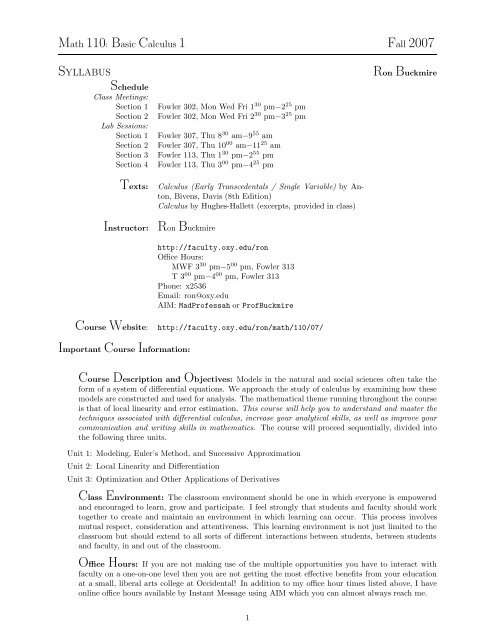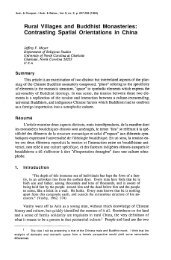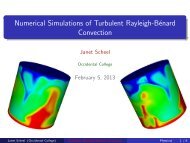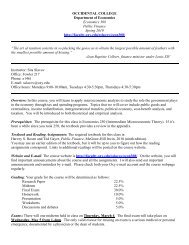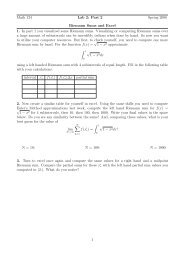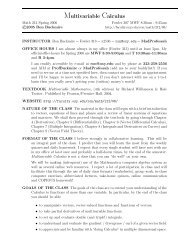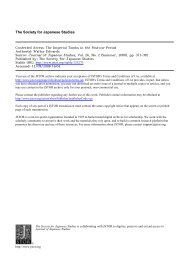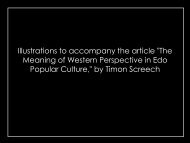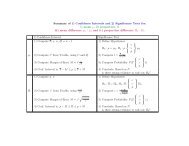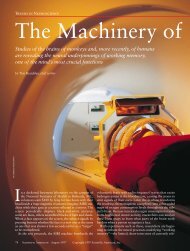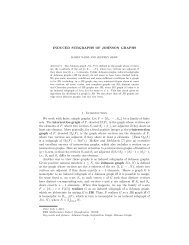Math 110: Basic Calculus 1 Fall 2007 SYLLABUS - Occidental College
Math 110: Basic Calculus 1 Fall 2007 SYLLABUS - Occidental College
Math 110: Basic Calculus 1 Fall 2007 SYLLABUS - Occidental College
Create successful ePaper yourself
Turn your PDF publications into a flip-book with our unique Google optimized e-Paper software.
<strong>Math</strong> <strong>110</strong>: <strong>Basic</strong> <strong>Calculus</strong> 1 <strong>Fall</strong> <strong>2007</strong><strong>SYLLABUS</strong>ScheduleClass Meetings:Section 1Section 2Lab Sessions:Section 1Section 2Section 3Section 4Texts:Instructor:Fowler 302, Mon Wed Fri 1 30 pm−2 25 pmFowler 302, Mon Wed Fri 2 30 pm−3 25 pmFowler 307, Thu 8 30 am−9 55 amFowler 307, Thu 10 00 am−11 25 amFowler 113, Thu 1 30 pm−2 55 pmFowler 113, Thu 3 00 pm−4 25 pm<strong>Calculus</strong> (Early Transcedentals / Single Variable) by Anton,Bivens, Davis (8th Edition)<strong>Calculus</strong> by Hughes-Hallett (excerpts, provided in class)Ron Buckmirehttp://faculty.oxy.edu/ronOffice Hours:MWF 3 30 pm−5 00 pm, Fowler 313T3 00 pm−4 00 pm, Fowler 313Phone: x2536Email: ron@oxy.eduAIM: MadProfessah or ProfBuckmireRon BuckmireCourse Website:http://faculty.oxy.edu/ron/math/<strong>110</strong>/07/Important Course Information:Course Description and Objectives: Models in the natural and social sciences often take theform of a system of differential equations. We approach the study of calculus by examining how thesemodels are constructed and used for analysis. The mathematical theme running throughout the courseis that of local linearity and error estimation. This course will help you to understand and master thetechniques associated with differential calculus, increase your analytical skills, as well as improve yourcommunication and writing skills in mathematics. The course will proceed sequentially, divided intothe following three units.Unit 1: Modeling, Euler’s Method, and Successive ApproximationUnit 2: Local Linearity and DifferentiationUnit 3: Optimization and Other Applications of DerivativesClass Environment: The classroom environment should be one in which everyone is empoweredand encouraged to learn, grow and participate. I feel strongly that students and faculty should worktogether to create and maintain an environment in which learning can occur. This process involvesmutual respect, consideration and attentiveness. This learning environment is not just limited to theclassroom but should extend to all sorts of different interactions between students, between studentsand faculty, in and out of the classroom.Office Hours: If you are not making use of the multiple opportunities you have to interact withfaculty on a one-on-one level then you are not getting the most effective benefits from your educationat a small, liberal arts college at <strong>Occidental</strong>! In addition to my office hour times listed above, I haveonline office hours available by Instant Message using AIM which you can almost always reach me.1
Goals and Outcomes: The <strong>Math</strong>ematics Department has developed a number of goals and measurableoutcomes during its Assessment process. In this class, we hope to make Introductory Progresstowards fulfilling the following Goals and Outcomes:Goal 1: Students will develop a fundamental knowledge of continuous and discrete mathematics:Outcome 1.1: Students will solve fundamental problems in single- and multi-variable <strong>Calculus</strong>Outcome 1.4: Students will utilize appropriate technology to illustrate basic mathematical knowledge, to graphfunctions, and to approximate.Goal 2: Students will learn how to learn mathematics independently and collaboratively.Outcome 2.1: Students will complete an individual or group project related to the content of an upper divisionmathematics course, and present the results of the project through a paper, poster, or talkOutcome 2.2: Students will learn and communicate mathematics to each other in a collaborative group settingHomework: Homework will be assigned daily but collected weekly and graded. Homework isdue each Thursday by 5 pm in the <strong>Math</strong> <strong>110</strong> Homework Box in Fowler 311. You areencouraged to attempt all of the assigned problems. In order to learn mathematics, one must practicemathematics. You are encouraged to work in groups, but the homework you submit must representyour own understanding and work. No Late Homework Will Be Accepted. Please read furtherinstructions about Homework on the web.Quizzes: There will be quizzes given on a near weekly basis. Quizzes will generally be given in labsection; however, some quizzes will be given as take home quizzes. The quizzes will resemble homeworkproblems which connect or advance important concepts and skills. Work on quizzes is subject to thesame rules as on exams (see below). No Late Quizzes Will Be Accepted.Labs and Lab Write-ups: Although listed by the Registrar as worth zero credit, labs are notoptional. You must be registered for a section of lab and a section of “lecture.” In the labs, you will havethe chance to collaborate with your fellow classmates in teams of two or three students. This work willfrequently involve computers using software such as True BASIC, Derive, and Excel, but no priorknowledge of computers or programming is necessary. The lab is a place where you will explore thecontent of the course in more depth, both because the computers can perform so many computationsso quickly and because your team will generally prepare a written report based on your work in lab.Labs are your opportunity to struggle with the difficult skill of successfully communicating your ideasand actively listening to the ideas of others as you work together in groups to produce well-written labreports and essays.Course Projects: There will be one course project for this class. Projects will be done in teams oftwo. Each pair will choose their own project. The goal of the project is to further your understandingof differential calculus as well as to advance your technical writing and oral communication skills ina context specifically tailored to your interests. A separate handout will be forthcoming on projectdetails and information. Projects will be completed by Wednesday, December 5.In-Class Exams: There will be three 1-hour evening exams. Exams will be given on the last Thursdayof each month: Thursday September 27, Thursday October 25, and Thursday November29. All exams are currently scheduled from 7:00 pm-9:00 pm. It is likely class will be cancelled thefollowing day. The reason exams are being offered in the evening is to provide you with as much timeas possible to take the exam instead of being limited to a 55-minute time slot. (The exam itself iswritten to be completed in 55-minutes.) If you have a conflict with the announced exam times pleasecontact me as soon as possible and alternate arrangements can be made. Students participating inathletics and co-curricular events should pay careful attention to this exam schedule and inform me inadvance of any conflicts.Final Exam: TBA. The rules of <strong>Occidental</strong> <strong>College</strong> will not recognize travel plans as an excuse tomove a final exam time.Gateway Exams: There will be three (3) Gateway Exams that will be given this semester. Failure topass a Gateway will result in lowering your final course grade by one third of a grade, per failed Gateway.See the forthcoming Gateway Information handouts and the Course Website for more information onthe Gateway exams.2
Class Handouts: Classes will combine lectures with more active learning. There will be dailyhandouts and worksheets supplementing the text for the course. You are strongly encouraged to utilizea system of organization that suits you and will allow you easy access to course materials. I suggestyou purchase a 3-ring binder to organize these handouts and your notes.Independent and Group Study: Students are strongly encouraged to study in groups, althoughwork turned in for evaluation must be your own. Our experience is that many successful calculusstudents combine individual and group study. The Academic Mastery Program will be available forthis course, offering a more structured form of group study. This program is very helpful in providing aconsistent setting in which you can work on the topics of the course, with the guidance of an experiencedtutor who consults with the faculty regularly. In addition, students often work together at the Centerfor Academic Excellence, located on the ground floor of the library. The CAE also offers Peer Advisingin mathematics by upper-class students on a regular basis with a schedulemto be announced later inthe semester.Technology: In the interests of enhancing active learning by students, I have decided to use PersonalResponse Devices (informally known as “clickers”) in a technology-ready room to provide opportunitiesfor students to demonstrate their engagement with the course material in a novel way. This is a newexperience for me as well for (most, if not all of) you so I encourage your patience and welcome yourhonest and well-considered feedback on the efficacy of this teaching innovation.Online Component: In the <strong>Math</strong> Department we are strongly committed to the use of technology toimprove and enhance teaching and learning. We make use of a number of Internet resources to assiststudents. We have class mailing lists, to which all registered students in <strong>Math</strong> <strong>110</strong> are subscribed.The addresses are <strong>Math</strong><strong>110</strong>sec1-L@oxy.edu for Section 1 (1:30 pm) and <strong>Math</strong><strong>110</strong>sec2-L@oxy.edu forSection 2 (2:30 pm). You should use the mailing list and our web-based bulletin board to communicatewith your colleagues in the class in a professional manner. You can use the class website to reviewhomework and exam solutions, check on the course schedule and interact with students and the professorto continue engagement with course material outside of the classroom. I hope to provide online accessto your course grades by the end of the semester. Try to check the Course Blog at least once beforecoming to each class. Important course announcements often may be found online before they occurin class.Calculator Use: You will need at least a scientific calculator with graphing capabilities for thiscourse. If you do not at present own a calculator, I recommend you buy the TI-83 graphing calculator.If you already own a different graphing calculator, you do not need to go out and buy a TI-83, but youmay have some work to do to figure out how our TI-83 specific instructions can be translated to workwith your calculator. We will be using the TI-83 in class, in lab and on exams.The use of calculators on exams is encouraged, BUT inappropriate use will not be tolerated. Forinstance, using the programming capabilites to record notes is dishonest work. If a question on anexam expressly forbids the use of the graphing capabilities of your calculator, it means just that. Ifyou have any doubt about using any features on your calculator on exams, ask one of the instructors.Do not trust your classmates to know what is allowed and what is not allowed. If you are caught usingyour calculator in an unacceptable manner, the matter will be referred to the Judicial BoardCourse Policies: You are expected to know and follow the policies below.Honest Academic Work: It is expected that each student in this class will conduct her- orhimself within the guidelines of the Student Handbook. All academic work should be done withthe complete honesty and integrity that this college demands.Accommodations: Please let me know immediately if you have specific physical or learning disabilitiesand require accommodations. These discussions will remain confidential. Documentationrequirements can be obtained from the Center for Academic Excellence (x2849).Classroom Conduct: Our primary goal in this classroom is to teach/learn/discuss/debate/enjoy/docalculus. This is best accomplished when we feel free to question and doubt, free to argue and exchangecreative ideas. If one feels threatened or unwelcome, this becomes impossible. Therefore,the classroom should be a safe space. All are welcomed and encouraged to actively participate3
in the learning of calculus, regardless of gender, race, nationality, native language, sexuality, politicalideology, and especially personal mathematical history. Any student who feels she or he isexperiencing a hostile environment should speak to the faculty about it, immediately.Make-Up Work: No late homework or quizzes will be accepted. If you know you must miss ascheduled quiz or exam, let me know as soon ¯ as possible beforehand and we will try to worksomething out. If work is not handed in due to an illness or emergency it will be ignored in thecomputation of your grade.Tardiness: Entering late disrupts the flow of class and sends the message that you do notrespect your fellow students or your professors. If you arrive late, enter quietly and deal withmissed handouts after class. If you will be late on a regular basis, please come and share thereasons with us before I approach you.Grading: The table below explains how your final average in this course will be determined.ScorepercentParticipation & Homework Average × 15% =Quiz Average × 15% =Project × 15% =Lab Average × 10% =Exam # 1 × 10% =Exam # 2 × 10% =Exam # 3 × 10% =Final Exam × 15% =Total:The grade scale below assumes that you have passed all of the gateway exams:average below 60–68 68–70 70–72 72–78 78–8060letter grade F D D+ C- C C+average 80–82 82–88 88–90 90-92 93+ 100letter grade B- B B+ A- A A(+)Unfortunately, there is no official A+.You are expected to keep track of your own quiz and lab averages. You should also keep all of yourquizzes and labs. This way, discrepancies can be worked out easily.4


